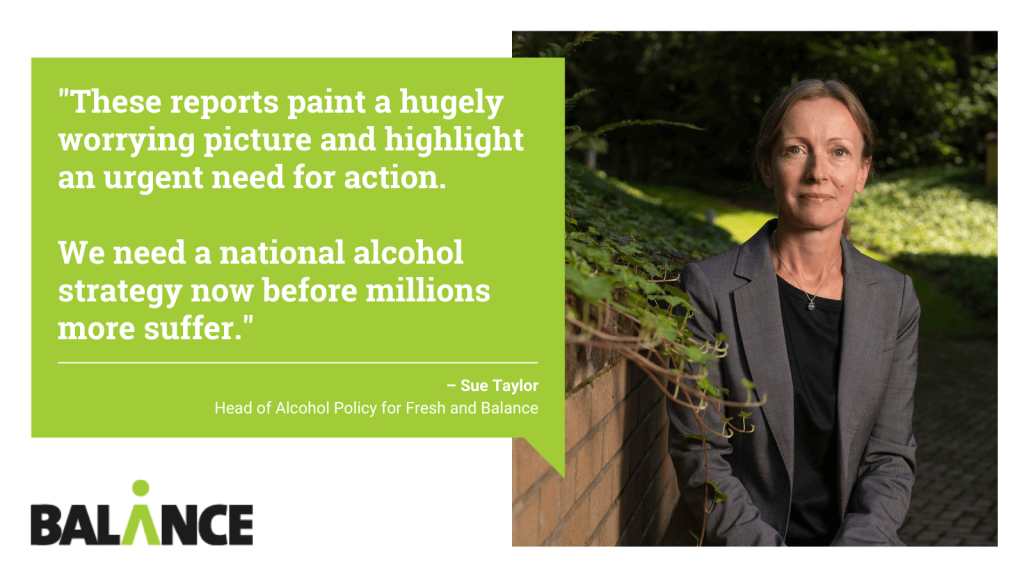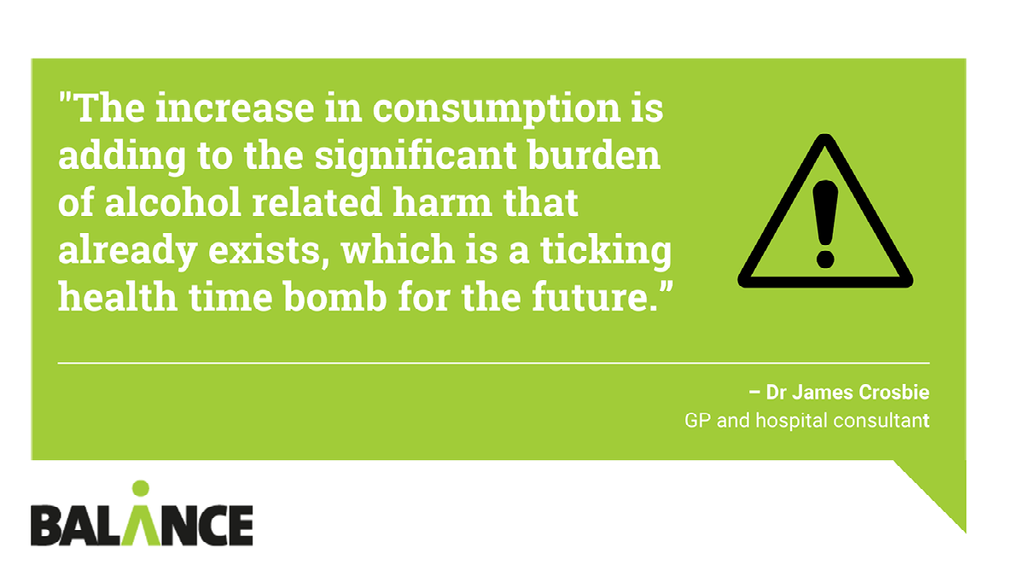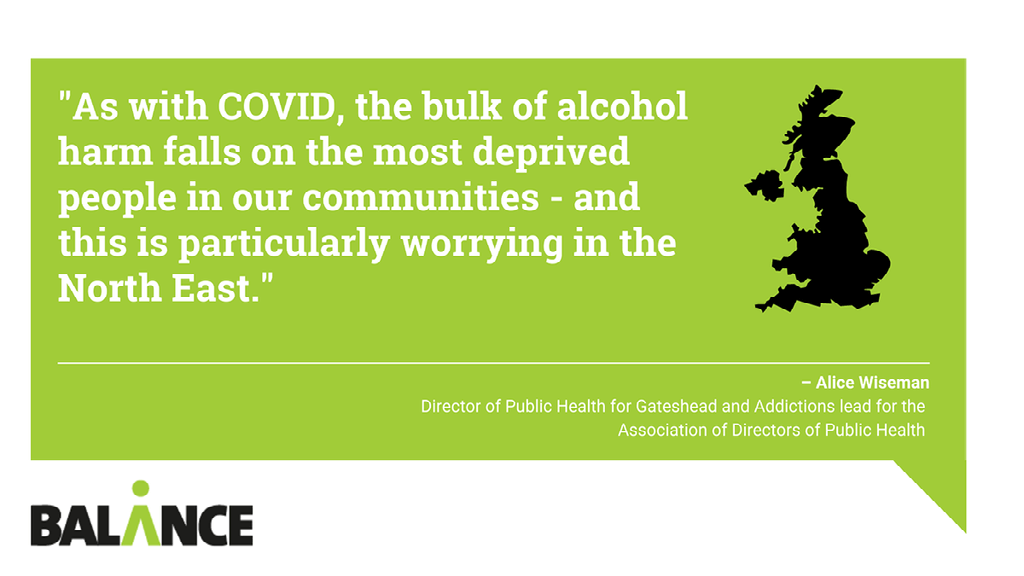Shift in England’s drinking during COVID-19 could lead to 150,000 more cases of disease by 2035
-
Balance responds to worrying new trends in alcohol consumption
Changes in alcohol consumption during the COVID-19 pandemic will potentially lead to thousands of additional premature deaths and cases of disease, new modelling research funded by the National Institute for Health and Care Research (NIHR) shows, with some of the worst impacts likely to be in the North East.
The pandemic saw heavier drinkers consuming more alcohol, with 47% of adults now drinking at increasing and higher risk levels in the region. If consumption does not return to 2019 levels or lower, England could see an additional 147,892 cases of nine alcohol-related diseases and 9,914 additional premature deaths, costing the NHS £1.2bn.
Three scenarios were modelled between 2022 and 2035 by the Institute of Alcohol Studies (IAS) and chronic disease modelling specialists HealthLumen, to project how recent changes in drinking may impact upon health harms from nine alcohol-related diseases – high blood pressure, stroke, liver cirrhosis, and six forms of cancer. The research found:
- If alcohol consumption returns to 2019 levels after 2022, there will be: 2,860 additional cases of disease and 2,431 additional premature deaths – with £363 million additional NHS costs.
- If alcohol consumption returns to 2019 levels after 2024, there will be: 24,706 additional cases of disease and 3,725 additional premature deaths – with £568 million additional NHS costs.
- If alcohol consumption does not return to 2019 levels (i.e. drinking patterns during 2020-21 become permanent), there will be: 147,892 additional cases of disease and 9,914 additional premature deaths – with £1.2 billion additional NHS costs.
The projected increases in premature deaths were larger among those less well-off in society, further widening inequalities, which already blight the North East.
The researchers warn that as the report provides a snapshot of a small number of the 200 diseases related to alcohol, the true impact is likely to be far greater. They highlight that the results are consistent with real-world increases in alcoholic liver disease and alcohol-specific deaths that have already occurred since the onset of the pandemic.
Joint Lead on the study Dr Sadie Boniface, from the Institute of Alcohol Studies, said: “Much of the health harm from alcohol is from chronic diseases which take years to develop. Our results shed light on the long-term impacts of recent changes in drinking patterns.
“These increases in alcohol harm, lives lost, and costs to the NHS projected in our study are not inevitable. Deaths from alcohol are at record levels, and this research should act as a ‘wake-up call’ to take alcohol harm seriously as part of recovery planning from the pandemic.”
Commenting on the report, Sue Taylor, Head of Alcohol Policy for Balance said: “The findings of these reports paint a hugely worrying picture about drinking patterns during the pandemic and highlight an urgent need for action. The UK was already at a crisis point with alcohol before COVID, but it is clear that the pandemic has magnified alcohol harms, with millions more drinking at risky levels, storing up huge problems in terms of alcohol-related illnesses and deaths in the future.

“We know that the North East suffers disproportionately and with almost half of the population drinking at increasing and higher risk levels and deaths from alcoholic liver disease higher than ever before, we can’t afford to ignore this problem any longer. Alcohol is too cheap, too available and too heavily promoted. We need the Government to take evidence-based action now, before millions more suffer.”
Dr James Crosbie, GP, consultant gastroenterologist and Clinical Lead for Alcohol for the North East and North Cumbria Integrated Care System, said: “I’m extremely worried by the increase in alcohol consumption during the pandemic and we are already seeing people that are experiencing problems as a result.

“There are some consequences that can happen quite quickly, such as effects on mental health, social problems, alcohol dependence and a number of acute medical conditions. Just as worrying are the multiple longer-term conditions that will inevitably increase over time as a direct result of increased drinking, including at least seven types of cancer, heart disease, stroke and liver disease.
“As these reports suggest, the increase in consumption is adding to the significant burden of alcohol related harm that already exists, which is a ticking health time bomb for the future.”
Alice Wiseman, Director of Public Health for Gateshead and Alcohol lead for the Association of Directors of Public Health, said: “As with COVID, the bulk of alcohol harm falls on the most deprived people in our communities and this is particularly worrying in the North East where, even before COVID, we already suffered from the highest rates of alcohol-related death and illness in England.

“As alcohol has got cheaper, the harm to individuals and communities has got worse. It is a scandal that people can drink a week’s worth of alcohol for the price of a coffee.
“The hugely concerning report from the Institute of Alcohol Studies and partners shows that it is time for action. The Government needs to introduce an evidence-based alcohol strategy, which tackles the cheapest strongest alcohol, restricts promotion and availability and funds treatment, to bring an end to the rising tide of alcohol-harm and death.”
